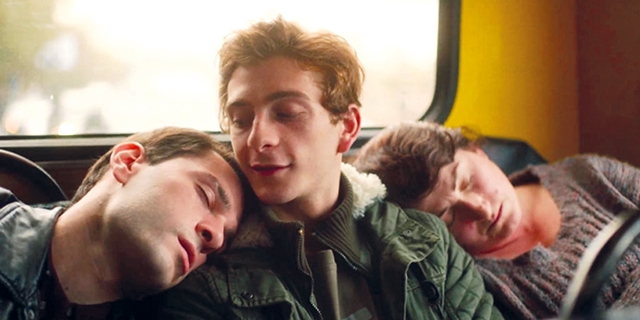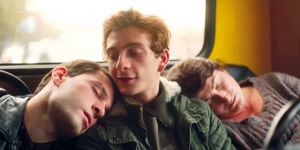Meet the Producer of ‘And Then We Danced’
Exclusive Interview
It seems like international society’s interest in the 2019 Swedish-Georgian drama film And Then We Danced, directed by Levan Akin, is as strong as ever, as months after its initial premiere at the Cannes Festival, the movie is being taken to movie theaters worldwide and is drawing critics from international magazines, from Vogue to the New York Times, to write reviews about the film, and interview its cast and crew.
Right now, the movie has a 8.1 IMDb rating and 89% on Rotten Tomatoes. GEORGIA TODAY sat down with Ketie Danelia, the producer of And Then We Danced, the first Georgian movie about gay love featuring Georgian national dance. With us, the producer and production manager, who also worked on movies Partisan (2015) and Dede (2017), Danelia talks about the challenges, reactions to and hopes for And Then We Danced.
What was your biggest challenge while working on the movie?
Each movie you work on has its own challenges, which makes the project somewhat more interesting. However, we didn’t have just one challenge while working on the movie And Then We Danced, we faced lots of them, much more than I ever had to overcome in the past with other films. From locations to copyright issues of Georgian music – we had lots of problems. We had to remake and create many songs because they weren’t giving us the right to use them. However, despite all this, I am very pleased with our final product. Even if there had been more difficulties, I would still have made this movie.
What are some of your best memories from working on it?
In the process of directing the movie, while working on set, we had a very friendly environment; had it been otherwise, I don’t think we would have been able to make it. On the set, especially when working on a project that is this problematic, it’s crucial to have a strong support system in the group. Of course, the working process always comes with some disappointment, and demotivation, but the feeling that you are making something important and interesting doesn’t allow you to give up on your work, and that feeling makes the hard work fun. That feeling never left us.
What was the inspiration behind the movie’s theme? Where do gay love and Georgian traditional dance meet?
The starting point of director, Levan Akin’s inspiration was what happened in Tbilisi on May 17, 2013 [50 people in Tbilisi organized a Pride parade, which would have been Georgia’s first, and they were attacked by thousands of people in a counterdemonstration that was organized by the Orthodox Church and some far-right groups]. But of course, that’s not all. There are a lot of social topics demonstrated in the film that bother us all. We wanted to share these issues with people, and to address them thoroughly. The problems weren’t the only thing we showed with the movie, we also gave the audience the greatest love.
If you had to produce the movie now, going back, would you have changed anything?
Yes. I guess there will always be some details that, after finishing the project, you want to go back and change. But I don’t see any problem in that. In the working process, too, with the experience I have now, I would have reconsidered many things. Above all, I would have liked more funds, a larger budget to shoot the movie with.
Tickets sold out in a blink of an eye in Georgia. Do you think that had it not been an LGBT-themed movie, the film would still have sparked such interest for its artistic value among Georgian society?
I’m not sure how to determine that if we take the context out of the film. If the theme wasn’t that, it would have had a different artistic approach, and would have ended up being a completely different film. There are many gay love-story movies, but are they all equally successful?
What do you think is the best way to remove the stigma that some Georgians have towards the LGBT community? Is cinema one of the best ways?
Of course. Art, and for me personally, cinema art. Because it is a great facilitator of self-dialogue for the audience, cinema is a great tool to defeat and overcome stigmas, phobias towards different groups of people, and other cruelties.
Remembering the protests that followed the decision to premiere the movie in Georgia, why do you think the film was so scandalous for Georgian society? Were there any such cases abroad? Did you expect this reaction when shooting the movie?
Obviously, we were expecting some reaction. Maybe for some part of society, the film turned out to be painful, I wouldn’t say scandalous, because the movie was like bumping into the reality they are living in but are refusing to face. There is nothing in the movie that is not happening in our everyday lives; it is not anything we haven’t heard of, at least. The film is just a reflection on the screen, the reflection of reality. Some people have a hard time facing reality. That’s why it was hard for them to accept this movie.
Tell us about the commercial success of the movie internationally.
The movie has received 50 awards, and has been screened at up to 80 international festivals. And the festival life still continues! What’s more, the movie will be shown in the theaters of up to 40 countries.
And Then We Danced is currently in the theaters of the US, nationwide, and in March, it will arrive in the United Kingdom.
In your opinion, how big was the influence of the movie on Georgian society and has it changed anything in their mentality?
While watching people watch the movie, I was surprised to find tears in the eyes of so many. This alone makes me believe that there can be change.











